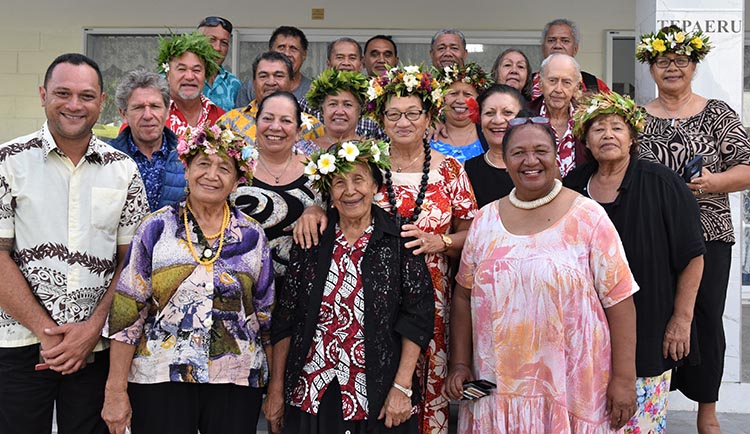Koutu Nui presents land law recommendations
Monday 11 October 2021 | Written by Melina Etches | Published in Local, National

Members of the Koutu Nui on the last day of their annual general meeting in June this year. 21061727
Those who live overseas should not determine the lives of those who live in the Cook Islands when it comes to land matters, recommends the Koutu Nui.
The Koutu Nui has presented its recommendations on the review of land laws to the Minister of Justice, and the House of Ariki.
Koutu Nui treasurer and co-secretary, TePa Mataiapo Imogen Ingram, said: “suggested changes to land court procedures – some of which we are assured are already being resolved – and recommendations for changes to land laws, have been requested to the Minister of Justice for a Parliamentary Select Committee to be established so that a very broad consultation can be undertaken”.
The executive committee of the Koutu Nui, the group comprising the country's sub-chiefs, made its recommendations from the outcome of a two-day workshop on land issues held in May that was reviewed, amended and endorsed on June 17 at its annual general meeting.
In regards to the review of 1915 Cook Islands Act, the report noted that “the general view is that the 1915 Cook Islands Act has served us well, but needs to be reviewed”.
“This may result in a constitutional issue for overseas Cook Islanders, but there is a strong feeling that those who live overseas should not determine the lives of those who live in the Cook Islands.”
The Koutu Nui have considered that there is a need to balance this issue against whether an absentee landowner, who is not in the land court to object to their share of land being taken, misses out.
READ MORE:
- Traditional leaders meet to define the rules for election processes
- Koutu Nui must return to their tribes, says Are Ariki
- Koutu Nui opposing Are Ariki’s proposed changes
- House of Ariki set to abolish Koutu Nui
Another recommendation that was put forward included that new legislation such as a Land Leases Act which makes clear all the mandatory requirements for a lease, to be introduced. For example, that all leases be limited to 60 years and should be valued every five years, together with any other provisions considered to be standard.
“The proposed Act would spell out the requirements which protect landowner rights but there should be the option to add additional clauses at the initiative of the landowners and the lessee.”
Another important law, the Property Law Act 1952, was amended in 1997 by Parliament to assure landowners receive certain benefits when they lease family land for commercial purposes, the report stated.
The 1997 amendment is commonly referred to as Section 106A and it provides, in part, for landowners, when granting a commercial lease, to receive an upfront goodwill payment in cash, a percentage of the income generated by the lease on their land, and a transfer consideration – “a piece of the pie, so to speak” – when the business on the land is transferred to a new owner/operator.
Cook Islands News on September 20, 2016 reported that “the legislation for Section 106A was so poorly written that for the past 19 years, people and companies with commercial leases have been able to ignore the law with the result that landowners have been greatly disadvantaged”.
The Koutu Nui proposes a clarification of Section 106A, stating, “many lessors have tried to avoid compliance with Section 106A of the Property Law Amendment Act 1997; they allege it is not clear how it will operate.
“The Court also found that Section 106A is not contrary to the Constitution of the Cook Islands and that the Leases Approval Tribunal is the suitable place where Section 106A should be enforced.”
Other references noted by Koutu Nui include to restrict non-resident successions – that non-resident Cook Islanders should be restricted in their ability to succeed further back than their grandparents; that there should be more public awareness-raising about the regulations of the Leases Approval Tribunal; and to establish a parliamentary select committee “to consider these recommendations, and any other submissions about land issues that might be put forward”.
Because many of their recommendations will be “considered controversial”, the Koutu Nui believe “it is appropriate that consultations should be as wide as possible and that everyone who has an interest in land which falls under the jurisdiction of the Land Court and who wishes to, will be able to have their say, whether written or verbal, and whether in Maori or English”.












































